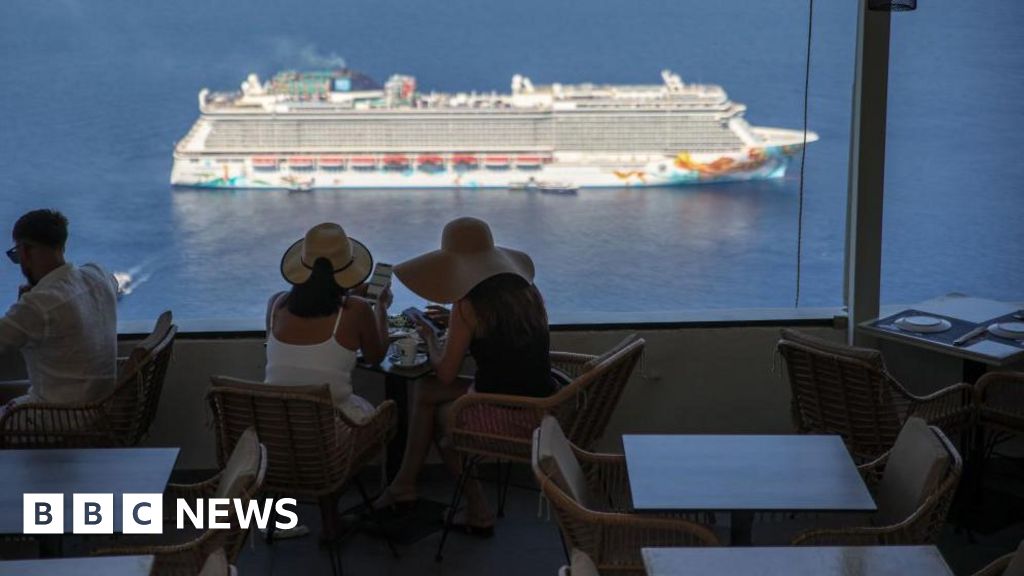
February signals the unofficial commencement of the tourist season on the captivating Greek island of Santorini, coinciding with the anticipated arrival of the first cruise ships and the approach of the Easter holiday.
However, following a series of earthquakes that have jolted the island since January, concerns are mounting regarding the potential impact on tourism. One cruise line has already canceled its scheduled visit, raising alarms about the viability of Santorini’s crucial tourism sector this year.
“We’ve noticed a decrease in bookings over the last two days, but we remain hopeful that this trend is temporary,” states Antonis Pagonis, president of Greece’s Association of Hoteliers.
Even if tourists don’t opt for alternative destinations this travel season, hotels anticipate a looming staffing shortage, complicating their ability to accommodate guests in the busy summer months.
As one of Greece’s most popular islands, Santorini heavily relies on seasonal workers from both domestic and international sources. These workers bolster the island’s permanent population of just over 15,000 to cater to the influx of tens of thousands of tourists daily during peak times.
Yet, the uncertainty surrounding the earthquake’s repercussions on tourist activity is leading some workers to reassess their summer employment options.
“I’m not particularly scared of earthquakes—Santorini has always experienced tremors,” shares Manos, a bartender who has spent the last five summers working on the island. Despite the demanding nature of his job during the bustling tourist season, the financial rewards have always justified the effort. This year, however, he fears things may be different.
“I’m concerned that there won’t be enough tourists. If the season turns out to be weak, my earnings might drop, or I could be let go before summer ends. I can’t afford that uncertainty,” he explains, opting for a job in Corfu instead.
The need for seasonal workers extends beyond summer; construction crews are also essential at this time to renovate hotels in preparation for the tourist influx.
However, work has stalled due to safety concerns related to the earthquakes. Consequently, hotel owners are advocating for government support to cover a majority of their workers’ salaries until renovations can safely resume.
“We have presented several proposals to the government aimed at supporting both current workers and those seeking seasonal employment,” remarks Mr. Pagonis, highlighting the government’s positive initial response, while emphasizing the necessity for subsequent action.
In response to the earthquake risks, Greek authorities have promptly deployed rescue teams to Santorini and declared a state of emergency to facilitate assistance. However, many in the tourism sector argue that these actions must be complemented by infrastructure investments on the island.
“The challenges will persist beyond the cessation of the earthquakes,” warns Margarita Karamolegkou, owner of four hotels in Santorini.
“During peak season, approximately 70,000 workers and 160,000 visitors flood the island daily. Although the state has acted swiftly in response to the tremors, we have long been requesting vital improvements, including a new port.”
Calls are also being made for stricter regulations governing private rental properties, which may not adhere to the same safety standards as the established hotels on the island.
Santorini is a significant contributor to Greece’s economy, accounting for around 2.5% of the nation’s GDP and generating approximately €5.9 billion (£4.9 billion) annually.
While there have been no outright cancellations reported thus far, hoteliers are noticing a reduction in bookings, and industry experts caution that prolonged uncertainty could severely impact local businesses.
During a visit to the island last Friday, Prime Minister Kyriakos Mitsotakis acknowledged the crucial need to uphold Santorini’s renowned reputation, referring to it as “an iconic tourist destination” and reiterating, “It is our duty to safeguard it, preserve its status, and ensure that 2025 brings another remarkable year for tourism.”
Ms. Karamolegkou, who employs 120 staff across her four hotels, recognizes the challenges ahead, admitting she may need to delay the opening of her properties if the seismic activity persists. Nevertheless, she remains hopeful for the future of the island’s vital tourism industry.
“We have a long history in the hospitality business, always striving for excellence. I am confident that our services will continue to be exceptional, even if we operate with fewer staff,” she concludes.









